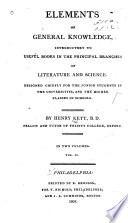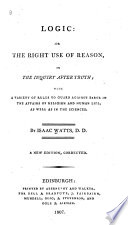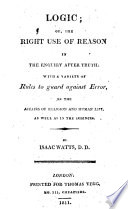 | William Enfield, Johann Jakob Brucker - Early works to 1800 - 1791 - 610 pages
...third, the Conclufion, and in which three terms are varioufly arranged. Thefe three terms are called the Major, the Minor, and the Middle term. The Predicate of the Conclufion, is called the Major Term, the fubjedi, the Minor, and both together the Extremes. The Middle... | |
 | Isaac Watts - Conduct of life - 1801 - 342 pages
...proxime or immediate matter of it. The three terms are named the major, the minor, Jj and the middle. The predicate of the conclusion is called the major ;\ term, because it is generally of a larger extension than//' the minor term, or the subject. The major and minor^ terms... | |
 | Henry Kett - Books and reading - 1805 - 340 pages
...ideas or terms variously joined. These three terms are Called the major, the minor, and the middle. The predicate of the conclusion is called the major term, because it is commonly of a larger compass and more general signification than the minor term, or subject of the... | |
 | Henry Kett - Encyclopedias and dictionaries - 1805 - 340 pages
...ideas or terms variously joined. These three terms are called the major, the minor, and the middle. The predicate of the conclusion is called the major term, because it is commonly of a larger compass and more general signification than the minor term, or subject of the... | |
 | Isaac Watts - 1807 - 320 pages
...proxime or immediate matten of it. The-three terms are named the major, the minor, and the middle. The predicate of the conclusion is called the major term, because it is generally of a larger extension than the minor term, or the subject. The major and miner terms are... | |
 | Isaac Watts - Conduct of life - 1811 - 298 pages
...proxime or immediate matter of it. The three terms are named the major, the minor, and the middle. The predicate of the conclusion is called the major term because it is generally of a larger extension than the minor term, or the subject. The major and minor terms are... | |
 | Johann Jakob Brucker, William Enfield - Philosophy - 1819 - 540 pages
...third the Conclusion, and in which three terms are variously arranged. These three terms are called the Major, the Minor, and the Middle Term. The Predicate of the Conclusion is called the Major Term, the subject the Minor, and both together the Extremes. The Middle Term is that which is introduced... | |
 | Levi Hedge - Logic - 1821 - 188 pages
...conclusion. I These are composed of three terms, denominated the major, the minor, and the middle terms. The predicate of the conclusion is called the major...most general ; and the subject of the conclusion, the miner term, because it is the least general. These two are also denominated the extremes ; and the... | |
 | Alexander Jamieson - Logic - 1822 - 312 pages
...or 'terms variously joined. 513. The three terms are named the major, the minor, and the middle. 1. The predicate of the conclusion is called the major term, because it is generally of a larger extension than the minor term, or the subject. The major and minor terms are... | |
| |